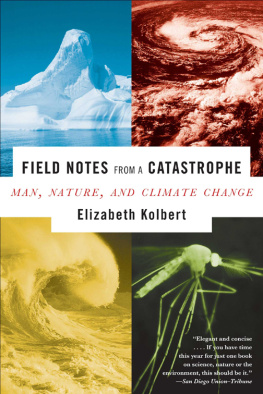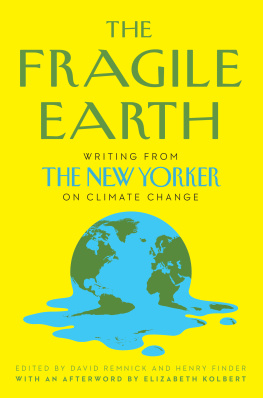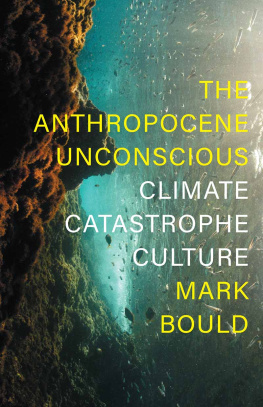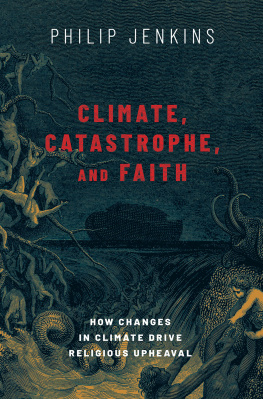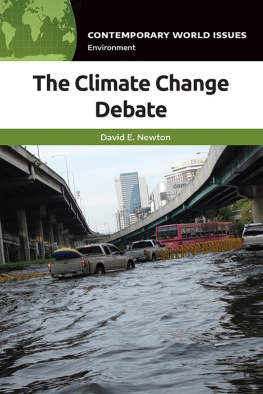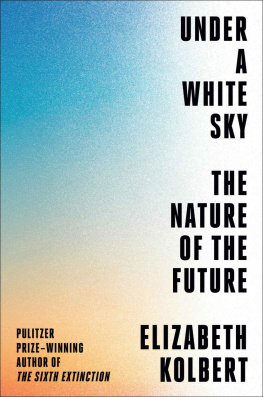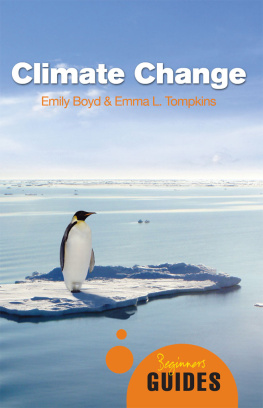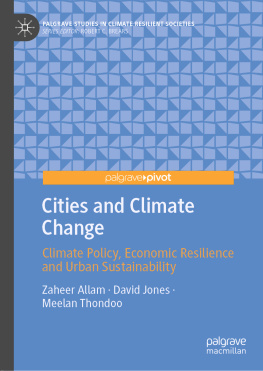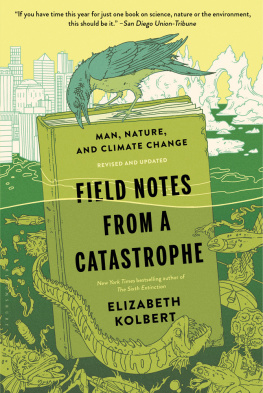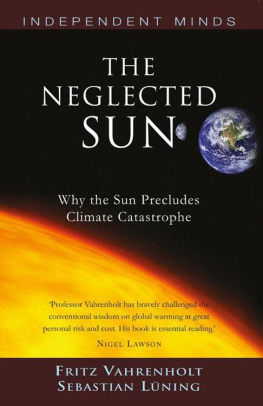Kolbert - Field notes from a catastrophe man, nature, and climate change
Here you can read online Kolbert - Field notes from a catastrophe man, nature, and climate change full text of the book (entire story) in english for free. Download pdf and epub, get meaning, cover and reviews about this ebook. City: New York, year: 2010;2009, publisher: Bloomsbury Publishing Plc, genre: Detective and thriller. Description of the work, (preface) as well as reviews are available. Best literature library LitArk.com created for fans of good reading and offers a wide selection of genres:
Romance novel
Science fiction
Adventure
Detective
Science
History
Home and family
Prose
Art
Politics
Computer
Non-fiction
Religion
Business
Children
Humor
Choose a favorite category and find really read worthwhile books. Enjoy immersion in the world of imagination, feel the emotions of the characters or learn something new for yourself, make an fascinating discovery.
- Book:Field notes from a catastrophe man, nature, and climate change
- Author:
- Publisher:Bloomsbury Publishing Plc
- Genre:
- Year:2010;2009
- City:New York
- Rating:5 / 5
- Favourites:Add to favourites
- Your mark:
- 100
- 1
- 2
- 3
- 4
- 5
Field notes from a catastrophe man, nature, and climate change: summary, description and annotation
We offer to read an annotation, description, summary or preface (depends on what the author of the book "Field notes from a catastrophe man, nature, and climate change" wrote himself). If you haven't found the necessary information about the book — write in the comments, we will try to find it.
Kolbert: author's other books
Who wrote Field notes from a catastrophe man, nature, and climate change? Find out the surname, the name of the author of the book and a list of all author's works by series.
Field notes from a catastrophe man, nature, and climate change — read online for free the complete book (whole text) full work
Below is the text of the book, divided by pages. System saving the place of the last page read, allows you to conveniently read the book "Field notes from a catastrophe man, nature, and climate change" online for free, without having to search again every time where you left off. Put a bookmark, and you can go to the page where you finished reading at any time.
Font size:
Interval:
Bookmark:
Field Notes from a Catastrophe
Man, Nature, and Climate Change
Elizabeth Kolbert
Bloomsbury USA
www.bloomsburyusa.com
Praise for Field Notes from a Catastrophe
Each chapter is part of a larger narrative, a loose travelogue that includes the Alaskan interior, Iceland and the Greenland ice sheet, but, more important, these narrative elements, while drawing us in, always keep a larger purpose in sightto offer the clearest view yet of the biggest catastrophe we have ever faced. Los Angeles Times
Comprehensive and succinct. New York Times
Elegant. Chicago Tribune
Kolbert weighs in with a slim but very powerful book. Chicago Sun-Times
Essential reading. [Kolbert] is an accomplished writer whose prose is deceptively simple and whose meaning is always clear. Climate change is complex stuff, but she deftly distills the brew to clarity. Minneapolis Star Tribune
Gripping, well-written. Seattle Times
Short, readable and scrupulously objective Kolberts central achievement is to have examined the complex panoply of data surrounding the science of climatology and to have presented it in prose as elegant as the facts themselves are stark. Times Literary Supplement
Very powerful important. Hartford Courant
Enlightening. Oregonian
Field Notes is a wonderful read, a superbly crafted, diligently compressed vision of a world spiraling towards destruction. It should be a wake-up call to the world. Observer (London)
Kolbert is like Matisse, painting an evocative picture with a few deft strokes I recommend [Field Notes] to anyone who has a concern for the fate of our planet. American Scientist
Kolbert, a staff writer for The New Yorker, surveyed the worlds leading climate scientists, and discovered an alarming unanimity to their message: The world needs to wake up, and fast. Wired
Lets hope this powerful, clear and important book is not just lightly compared to Silent Spring. Lets hope it is this eras galvanizing text. Scientific American
An elegant ride through the confusing world of climate science. Kolbert takes a John McPheestyle ramble across the world: In Greenland, Iceland, and poor little Shishmaref, she sees the effects of warming firsthand. In Washington, D.C., the former New York Times political reporter puts her Beltway savvy to use, revealing that the most climate-change skepticism originates in the deep pockets of oil and coal companies. Outside
Keenly observed and deeply memorable the picture [Kolbert] draws is compellingand very scary. Seed
An extraordinary piece of reporting. Grist.org
Kolbert forces us to ponder a tragic disconnect: Politicians, the group best positioned to do something about the scientists warnings, turn out to be the group thats most adamantly ignoring those warnings. Austin American-Statesman
[Kolbert] traverses the globe to observe first hand the jaw-dropping results of climate changes species going extinct, polar caps melting, water rising in the Netherlands or butterflies in England migrating to higher elevations than ever before. Contra Costa Times
The hard, cold, sobering facts about global warming and its effects on the environment that sustains us. Kolberts Field Notes from a Catastrophe is nothing less than a Silent Spring for our time. T.C. Boyle, author of Talk, Talk
Kolbert mesmerizes with her poetic cadence in this riveting view of the apocalypse already upon us. Robert F. Kennedy, Jr., author of Crimes Against Nature
Reading Field Notes from a Catastrophe during the 2005 hurricane season is what it must have been like to read Silent Spring forty years ago. When you put down this book, youll see the world through different eyes. Sylvia Nasar, author of A Beautiful Mind
[I]f you know anyone who still does not understand the reality and the scale of global warming, you will want to give them this book. Jonathan Weiner, author of The Beak of the Finch
This country needs more writers like Elizabeth Kolbert. Jonathan Franzen, author of The Corrections
Deliver[s] an exceptionally clear picture of how global warming is already on us and what disasters lie in wait should we fail to act. Salon
The brilliance of Field Notes from a Catastrophe flows from Kolberts gift for making the violence of climate change feel vast yet intimate Her field-journal format adroitly bridges the gulf between professionals and amateurs, giving the writing a conversational tone without compromising the science. Slate
By the same author
The Prophet of Love
Copyright 2006 by Elizabeth Kolbert
All rights reserved. No part of this book may be used or reproduced in any manner whatsoever without written permission from the publisher except in the case of brief quotations embodied in critical articles or reviews. For information address Bloomsbury USA, 175 Fifth Avenue, New York, NY 10010.
Published by Bloomsbury USA, New York
LIBRARY OF CONGRESS CATALOGING-IN-PUBLICATION DATA
Kolbert, Elizabeth.
Field notes from a catastrophe : man, mature, and climate change / Elizabeth Kolbert
1st U.S. ed.
p. cm.
Includes bibliographical references and index.
ISBN: 978-1-59691-125-3 (hardcover)
1. Global Warming. 2. Global temperature changes. 3. Global environmental change. I.
Title.
QC981.8.G56K655 2006
363.738'74dc22
2005030972
First published by Bloomsbury USA in 2006
This e-book edition published in 2010
E-book ISBN: 978-1-60819-567-1
www.bloomsburyusa.com
To my boys
Authors Note
The language of science is metric; however, most British and American readers speakand thinkin units like feet, miles, and degrees Fahrenheit. I have used English units where practical and metric units where it seemed clearly more appropriate. For instance, the standard measure of carbon emissions is metric tons. A metric ton weighs 2,205 pounds.
Contents
There isnt much to do at the Hotel Arctic except watch the icebergs flow by. The hotel is located in the town of Ilulissat, on the west coast of Greenland, four degrees north of the Arctic Circle. The icebergs originate some fifty miles away, at the end of a long and fast-moving ice stream known as the Jakobshavn Isbrae. They drift down a fjord and through a wide-mouthed bay, and, if they last long enough, end up in the North Atlantic. (It is likely that the iceberg encountered by the Titanic followed this route.)
To the tourists who visit the Hotel Arctic, the icebergs are a thrilling sight: beautiful and terrible in equal measure. They are a reminder of the immensity of nature and the smallness of man. To the people who spend more time in Ilulissatnative Greenlanders, European tour guides, American scientiststhe icebergs have come to acquire a different significance. Since the late 1990s, the Jakobshavn Isbrae has doubled its speed. In the process, the height of the ice stream has been dropping by up to fifty feet a year and the calving front has retreated by several miles. What locals now notice about the icebergs is not their power or immensitythough they are still powerful and immensebut a disquieting diminishment.
You dont get the big icebergs anymore, an Ilulissat town councilman named Jeremias Jensen told me. We were having coffee on a late-spring afternoon in the Hotel Arctic lobby. Outside, it was foggy and the icebergs seemed to be rising up out of the mist. Its very strange the last few years; you can see a lot of strange changes.
This is a book about watching the world change. It grew out of three articles that I wrote for the New Yorker magazine, which ran in the spring of 2005, and its goal remains much the same as that of the original series: to convey, as vividly as possible, the reality of global warming. The opening chapters are set near or above the Arctic Circlein Deadhorse, Alaska; in the countryside outside of Reykjavk; at Swiss Camp, a research station on the Greenland ice sheet. I went to these particular places for all the usual journalistic reasonsbecause someone invited me to tagalong on an expedition, because someone let me hitch a ride on a helicopter, because someone sounded interesting over the telephone. The same is true of the choices that were made in subsequent chapters, whether it was a decision to track butterflies in northern England or to visit floating houses in the Netherlands. Such is the impact of global warming that I could have gone to hundreds if not thousands of other placesfrom Siberia to the Austrian Alps to the Great Barrier Reef to the South African fynbosto document its effects. These alternate choices would have resulted in an account very different in its details, but not in its conclusions.
Next pageFont size:
Interval:
Bookmark:
Similar books «Field notes from a catastrophe man, nature, and climate change»
Look at similar books to Field notes from a catastrophe man, nature, and climate change. We have selected literature similar in name and meaning in the hope of providing readers with more options to find new, interesting, not yet read works.
Discussion, reviews of the book Field notes from a catastrophe man, nature, and climate change and just readers' own opinions. Leave your comments, write what you think about the work, its meaning or the main characters. Specify what exactly you liked and what you didn't like, and why you think so.

